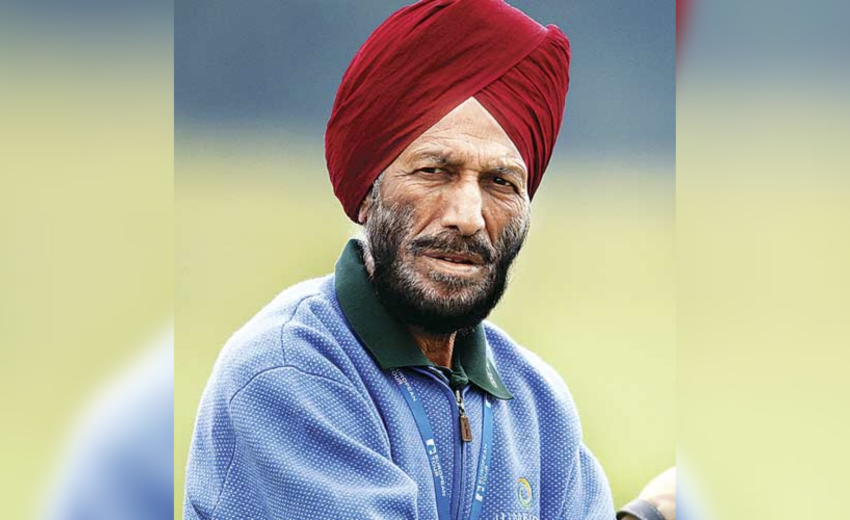Have you ever heard of The Flying Sikh? This name immediately brings to mind a strong Sikh man, standing tall and proud, wearing a neatly pressed turban. Milkha Singh's story is a true inspiration in Indian sports, earning him the well-deserved sobriquet of the Flying Sikh, and solidifying his place in history as a legend.
Milkha Singh, who fought and survived battles that few could have endured, passed away at 91 due to COVID-19 after a month-long fight on 18 June 2021.
He was a track and field sprinter from India who got his start in the sport while serving in the Indian Army. He was also the first athlete to have won gold in the 400m at both the Asian and Commonwealth Games.
Early life
Originally from Punjabi, Milkha Singh had to escape to Delhi at the age of 15 after witnessing the gruesome murder of his parents during the partition. He had to resort to petty crimes to survive in the refugee camps, which led to his imprisonment. After failing three times to join the army, Milkha was finally able to succeed in his fourth attempt, which became the turning point of his life. While posted in Secunderabad, he participated in his first race and finished sixth.
Later, he was selected for special training in the 400m race, and the rest is history. Milkha Singh's intense training after his disappointment at the 1956 Olympics made him vomit blood and fall unconscious many times, but he persevered. He earned the nickname of "The Flying Sikh" and went on to win several medals, including four gold medals at the Asian Games and the 1958 Commonwealth Games.
Milkha Singh's fourth-place finish in the 400m final at the 1960 Rome Olympics was his greatest performance, which remained the national record for 38 years. He was also awarded the Padma Shri in 1959 for his achievements. Milkha Singh was the one who put Indian athletics on the world map by winning the gold in the then 440 yards race of the 1958 British and Commonwealth Games.
Flying colours in sports
Milkha achieved a remarkable feat by winning an individual gold medal in the Commonwealth Games and becoming the first Indian athlete to do so. This victory was significant enough that then Prime Minister Jawaharlal Nehru declared a national holiday upon Milkha's request. Milkha had an impressive record of 77 wins out of 80 races, and he even claimed to have beaten the 'Olympics record' at a race in France. Unfortunately, it's challenging to confirm this achievement, much like his official date of birth, which is November 20, 1929.
Despite his numerous victories, he lost the most critical race of his life in the Rome Olympics, where he finished fourth with a time of 45.6 seconds, just 0.1 seconds behind the bronze medalist. Milkha made a significant error by slowing down in the last 150m, hoping to preserve his energy for a final sprint. This loss haunted him throughout his life, along with the unforgettable tragedy of losing his parents in Pakistan. Milkha wrote about his life in a 160-page autobiography that coincided with the release of the popular biopic 'Bhaag Milkha Bhaag.'
A significant accolade
Milkha's most significant achievement came in the 1960 Indo-Pak sports meet, where he outran Pakistani Abdul Khaliq before the Rome Olympics. Khaliq was considered the fastest man in Asia, having won the 100m gold in the 1958 Asian Games, but Milkha beat him in the 200m final and was christened 'The Flying Sikh' by then Pakistan President General Ayub Khan.
Life after retirement
Milkha Singh retired from athletics after winning gold in the 400m and 4x400m relay events at the 1962 Asian Games in Jakarta. Two years later, in 1964, he retired from athletics altogether. He took up the job of deputy director of sports in the Punjab government in 1961 and quit the Indian Army to move from Delhi to Chandigarh.
In 1991, Milkha introduced a compulsory games period in schools and set up sports wings in districts to discover new talent. In 1963, he married Nirmal Kaur, the captain of the Indian volleyball team, and they had three daughters and a son, Jeev Milkha Singh, who became a professional golfer.
Milkha famously declined the Arjuna Award in 2001, feeling that it did not match the services he rendered to the nation.
The track, to him, was like an open book in which Milkha Singh found the "meaning and purpose of life".
Milkha was more than just his races and medals; he was India's beloved track hero, a love affair that the country can never forget.
